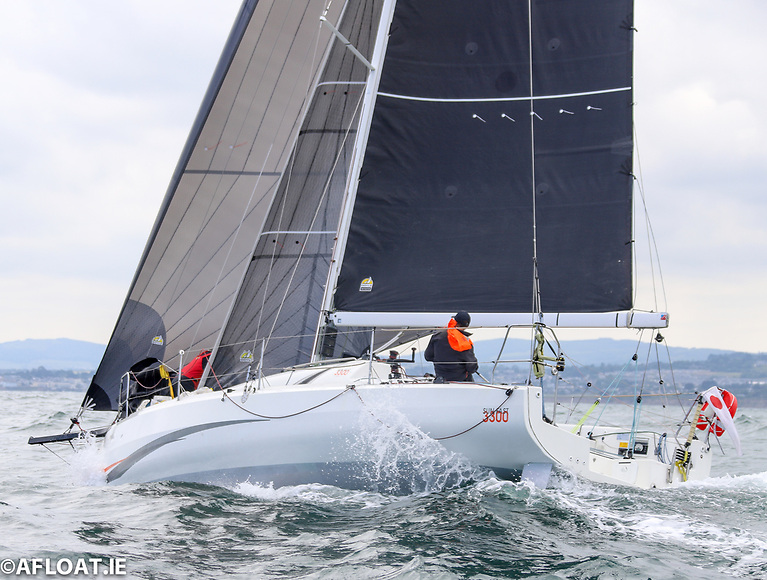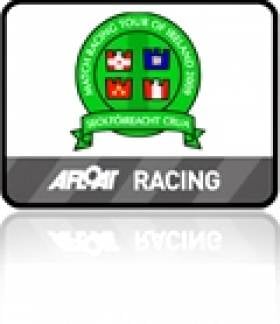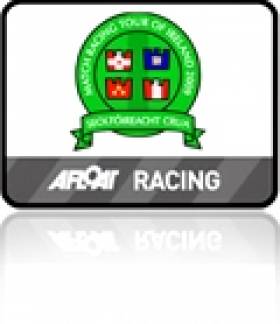Displaying items by tag: Sam Hunt
The attractive Sunfast 3300 Cinnamon Girl made an impressive post-pandemic impact with last year’s Inishtearaght Race from Kinsale. But for 2023, her hand-in-glove team of Cian McCarthy and Sam Hunt made an international impression with fantastic coordination and impressively high-speed sailing in a souped-up boat, setting larger headsails with a lengthened bowsprit.
In an otherwise big boat Dun Laoghaire to Dingle race, they were right there with the second batch of leaders on the water, maintaining the full-on pace right to the end to finish second overall and win the two-handed division going away. A masterful performance by any standards.
 With her lengthened bowsprit, Cinnamon Girl is an even more impressive performer in 2023
With her lengthened bowsprit, Cinnamon Girl is an even more impressive performer in 2023
Kinsale’s top two-handers Cian McCarthy and Sam Hunt with the Sunfast 3300 Cinnamon Girl seem to have already put in enough successful sailing in the season of 2022 to fulfil the ambitions of many crews for a whole year. And all that even if now - at mid-June - the Summer itself seems remarkably unenthusiastic about putting in an enduring appearance, whereas a cold and blustery Spring doesn’t realise that it has long out-stayed its welcome.
Back on the 20th May, when the new 240-mile Inishtearaght Race went off from their home port, the two shipmates and their fully-crewed rivals were sailing on what looked like a gloomy March day. And though they found some sunshine off the southwest seaboard while using rock-bound Inishtearaght for the first time as a race turning mark, by the time they got back to Kinsale the murk had closed in again. But the Cinnamon boys scarcely noticed, as they finished second on the water, took a good first on Corrected Time, and rounded out the month of May by becoming the Afloat.ie “Sailors of the Month”.
 Job done. Cinnamon Girl back in Kinsale after being round the Blaskets, closing in on winning the Inish Tearaght race overall. Photo: Robert Bateman
Job done. Cinnamon Girl back in Kinsale after being round the Blaskets, closing in on winning the Inish Tearaght race overall. Photo: Robert Bateman
But they were only getting going, for like all Sunfast 3300 crews, they’re campaigning the high-profile new boat whose public debut was most adversely affected by the pandemic. For sure, Cinnamon Girl and other hyper-keen Cork and Dublin Bay offshore boats did manage some sport with carefully restricted events like the Fastnet 450 during the easings of the lockdown. Yet these were almost under-the-radar happenings, not at all like the hell-for-leather competition you relish when putting a new boat of clearly great potential through her paces.
Thus this coming Saturday’s SSE Renewables Round Ireland Race from Wicklow has added appeal, with its sense of the last of the restrictions being thrown to the winds. And for the Cinnamon Girl and boys, this past weekend saw the buildup accelerating, with a record-breaking positioning passage from Kinsale to the East Coast in which they were whizzing along for hour after hour at speeds of 15 to 21 knots, even managing to see a sunset – albeit a rather watery one – as they made speed along the Wicklow coast.
(Above) Cinnamon Girl at the weekend, making 15-21 knots on passage from Kinsale to the East Coast
They’re a formidably experienced team. Cian McCarthy – having learned the ropes with Denis Doyle on Moonduster - has raced the Mini Transat. He got fourth in the first leg, but broke the forestay on week one of transatlantic second leg, yet raced on without a forestay for the rest of the crossing - perhaps a first Transatlantic crossing without a forestay. He also won the BT Global Challenge, raced open 40's as well as many Commodores Cup and Admirals Cup, and has five Round Irelands done previously - two of the double-handed.
Sam Hunt is also a Kinsale native, with broad background in dinghies and keelboats. He was the only civilian in the crew on the British Army boat for the last four Round Irelands. Additionally, he’d lots of wins in Match and Team racing, did a 470 Olympic campaign with Gerbil Owens in 2005 - 06, and has also raced with the Mumm 30's on Mammy, and the Melges with Team Barbarians, while logging successful experience in SB20s and 1720s, and racing the legendary Tiamat in IRC and Commodores Cup series.
While this will be Sam’s fifth Round Ireland, it will be his first double-handed, and he and Cian McCarthy seem to be melding as a formidable duo. They’ve optimised their prospects with in-depth input on sails from Nin O’Leary, and now all they need going round Ireland is more of the conditions they experienced this past weekend to made Cinnamon Girl even more of a force to be reckoned with.
 Kinsale in the morning, Wicklow sunset in the evening – that’s the sort of passage-making the Sunfast 3300 can achieve when conditions suit.
Kinsale in the morning, Wicklow sunset in the evening – that’s the sort of passage-making the Sunfast 3300 can achieve when conditions suit.
Ireland's most westerly Atlantic outcrop, the Blasket Islands, are so imbued with mythology and an almost supernatural ruggedness that no-one had previously thought of using the group’s lighthouse island, Inishtearaght, as the turning point for a 240-mile offshore race. But they think outside the box in Kinsale YC. On the morning of Friday May 20th, the inaugural Inishearaght Race got underway with a fleet which made up in quality anything it lacked in quantity.
Among the renowned fully-crewed boats, the smallest competitor was the eye-catching little Sunfast 3300 Cinnamon Girl, and the interest was heightened by the fact that owner Cian McCarthy and regular shipmate Sam Hunt were undertaking this new challenge two-handed. Yet after a rugged race taking them to an even more rugged setting, when the boats got back to Kinsale in late evening on the Saturday, not only was the big-hearted little Cinnamon Girl second across the line, but she won handsomely on a corrected time which made no allowance for the fact that there were only the two of them on board. We salute their special achievement – only one crew will ever be down in the records as the winner of the first Inishtearaght Race.
 Cinnamon Girl approaching Kinsale Harbour and a great win – sailors of fully-crewed boats might care to note the absence of trailing lines Photo: Robert Bateman
Cinnamon Girl approaching Kinsale Harbour and a great win – sailors of fully-crewed boats might care to note the absence of trailing lines Photo: Robert Bateman
Two Teams Set for Nations Cup
Sam Hunt has extensive match race experience having achieved third place in the ISA Match Race Championship and scoring highly on the Irish Match Race Tour in 2011. He is currently placed 308 in the ISAF World Match Race Open Rankings. Laura Dillon is the current Irish Women's champion having won the ISA Women's Match Race Championship in 2011. She is currently placed 116 in the ISAF World Match Race Women's Rankings and is a previous winner of the ISA All Ireland Sailing Championship.
Match Racing has grown strongly in Ireland since the ISA launched their SailFleet of J/80 keelboats in 2007 and the formation of the Match Race Ireland association in 2010. Among the events that SailFleet has facilitated are the ISA All Ireland and Match Race Championships, the ISAF Nations Cup 2007 Regional Final in Kinsale and the Bangor Match Cup a Women's Grade 1 event on Belfast Lough next August.
"The ISAF Nations Cup is a very tough competition and the best match racers in the world competing. Having hosted the Grand Final in Cork and a Regional Final more recently in Kinsale our sailors know that the standard will be high. Both Sam and Laura are very experienced match racers and know what they need to do to come out on top in these competitions." said Ed Alcock of the ISA.
The ISAF Nations Cup is a global competition to find the world's top match racing nations in both open and women's events and to develop match racing infrastructure around the world. The ISAF Nations Cup website is here: http://www.sailing.org/nations-cup.php
Sheehy Retains Match Race Title
Dun Laoghiare's John Sheehy retained his National Match Racing Championship title in Kinsale yesterday. The top three teams were: Jodapama Racing (John Sheehy) 2: Mad Match Racing (Ben Duncan) and 3rd: Gladiators (Sam Hunt). Vidcasts with the winners below:
Jodapama Racing have retained their Irish match racing title but had to do it the hard way. Lieing in 4th place over night the pressure was on to make the final and was made worse when they lost the openning race of the second day to Ban Duncan and MadMatch Racing.
After that openning loss John Sheehy, Darragh O'Connor, Paddy Kirwin and Marty O'Leary sailed away from the start area to regroup and came back firing, finishing on 8 wins. Mean while MadMatch kept on racking up points, their final tally topping the table at the end of the round robbin with 9 wins. Prof O'Connell (North Sails Ireland) and Sam Hunt (Gladiators) lead going into day 2 and despite mixed fortunes on day 2 held on to finish on 7 wins a piece to contest the 3rd/4th place play off.
In the 2-0 final Jodapama held pressure off the start in both races to take an early initial lead which they defended to the line despite being put under pressure all the way by MadMatch. 3rd place went to the Gladiators in a nip and tuck 2-1 play-off.
The win also secures Jodapama the Tour title for the second year finishing on 48 points. MadMatch Racing do enough to take 2nd on 29 point with Team Lazarus holding on to 3rd on 26. Gladiators and North Sails Ireland tie on 18 points, with the win in the final race of the play-off giving the Gladiators 4th place on the Tour standings.
Match Racing Day One Video: Prof on Top in Kinsale
Prof O'Connell topped the leader board at the end of the first round round robin stage of the Irish Match Racing Championships in Kinsale. (VIDEO BELOW) Sam Hunt and the Royal St George Gladiators are next and in an unexpected turn of events the defending champion, John Sheehy from Dun Laoghaire, has yet to shine.
John has dominated match racing in Ireland for the last couple of years and is the defending National and Irish Match Racing Tour champion.
For the first couple of flights it looked to be business as usual but then he ran up against Ben Duncan and Mad Match Racing. A first loss lead to second and then a third leaving the event wide open.
A second round robin started late today and will compete tomorrow before a best of 3 race finals. Any one of 5 teams still in with a shot of the title.
As an extra feature of the event the Irish Match Racing team have prepared the following vidcasts from Kinsale:
Local helmsman George Kingston describes his match
Umpires describe events on the water
Andrew Deakin (left) and Brian Carlin describe events on the water
Vidcast by Brian Carlin

































































